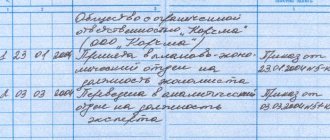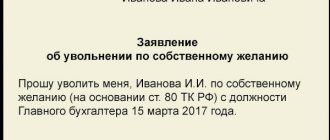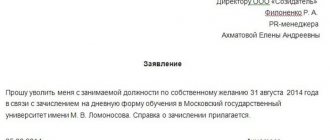How long before retirement can an employment contract be terminated?
How many years before retirement can an employee be fired and can, for example, be fired a year before retirement? Starting in January 2020, legislation came to protect persons called pre-retirement pensioners (when there are 5 years left before reaching retirement age).
The norm of Art. 144.1 of the Criminal Code of the Russian Federation introduced criminal liability for employers who violate the procedure for dismissing this category of workers (for example, requiring employees to resign of their own free will or dismissing for minor labor misconduct).
However, on the grounds established by Art. 81 of the Labor Code of the Russian Federation, have the right to dismiss regardless of whether he has reached retirement age or whether he has 1 to 5 years left before it . For example:
- liquidation of an organization or downsizing;
- the employee has not completed the probationary period;
- he has a record of gross violation of discipline and guilty actions;
- the manager or chief accountant resigns due to a change in the owner of the enterprise, etc.
Rights upon dismissal of persons of pre-retirement age
Questions about the rights of pensioners upon dismissal at their own request are related to questions of the rights of persons of pre-retirement age.
According to the draft law “On Amendments to the Criminal Code of the Russian Federation” No. 544570-7, which envisages the establishment of liability for the dismissal of persons due to their age, it is proposed that this age be considered the 5-year period before old-age pension.
Currently, the dismissal of persons of pre-retirement age is generally carried out according to the same rules as the dismissal of other persons. However, the following must be taken into account:
- specialized acts and tripartite agreements may establish additional guarantees (for example, dismissal due to reduction without employment of persons of pre-retirement age 2 years before the assignment of a pension should not be allowed in accordance with the Federal Tariff Agreement in the elevator industry and the field of vertical transport for 2020, approved by OPRZh, OOORLK " Federation of Elevator Enterprises" 09/30/2015);
- when applying industry standards on the rights of persons of pre-retirement age upon dismissal, the industry affiliation of the employing company should be clearly defined (appeal ruling of the Supreme Court of the RS (Yakutia) dated March 26, 2018 in case No. 33-1124/2018).
Is it possible to fire an employee a year before retirement?
It is possible if the enterprise ceases its activities, as well as on other grounds specified in Articles 77, 78, 80, 81 and 83 of the Labor Code of the Russian Federation. But the employer must follow the entire procedure.
An employee of pre-retirement age can be dismissed for these reasons at any time. A year remaining until retirement is not protection from dismissal.
Rights of a working pensioner
The dismissal of a pensioner must be completely legal, without violating the personal rights and interests of the elderly person. Dismissal of a working pensioner at his own request or at the initiative of his boss are two different things. And, accordingly, the procedure for dismissal is very different.
Today, more and more often you can meet a working elderly person who, due to some circumstances, cannot afford to go on vacation. Not everyone can boast of a high pension. But you have to pay for utilities and medicine somehow.
Old people have to survive somehow; they get a job somewhere or continue their work at their previous place of work. Moreover, regardless of age and health status.
It is not at all easy to fire such workers: as mentioned above, they have benefits. A list of benefits for this category of subordinate employees can be found in the Labor Code.
So, the main rights of pensioners are the following:
- the employer does not have the right to fire employees simply because of age;
- obtaining pensioner status cannot be grounds for dismissal;
- an elderly person may not work 2 working weeks if he quit of his own free will.
Age discrimination is prohibited - this is written in the Labor Code of the Russian Federation. The employer will have to bear financial responsibility and will be subject to penalties.
Plus, due to age, a pensioner is automatically considered a more qualified employee. Therefore, this fact to some extent protects the older employee from dismissal.
The only exception can be for civil service employees - upon reaching a certain age, the employee in some cases is automatically sent on vacation.
Due to retirement
A retired employee who did not resign after reaching retirement age has the right to leave work in connection with retirement. The procedure as a whole will not be any different, except for the wording in the documents and the fact that the employer does not have the right to force such an employee to work 2 weeks after submitting the application.
- Submitting an application.
Practice shows that an application should be submitted at least 3 days in advance so that management can complete all personnel documents and make payments on time.
The main part must include the wording “I request you to resign at your own request due to retirement.”
- Order and execution of personnel documents.
As mentioned above, the work book must also contain language about retirement. This is necessary in order to recalculate pension payments. It is important to note that the employee will not be able to resign a second time “due to retirement”: the procedure for terminating the employment contract will be carried out in accordance with the general procedure.
Nuances
With an employee who has indicated in the application a specific desire to leave work due to retirement, the contract must be terminated on the date specified by him.
In what cases is a pensioner fired with service?
There are differing opinions on the legality of the requirement to work off when dismissing a pensioner who got a job after he had already taken a well-deserved rest.
By all logic, he cannot retire again, since he has already applied for it, and he himself has expressed a desire to work again.
On the other hand, this may be regarded as the impossibility of continuing to work further.
We must pay tribute to the fact that, as a rule, if the decision to resign by a working pensioner is made on his own initiative, employers do not force him to work, even if the person got a job after retirement.
But, if the employer formalizes the dismissal 2 weeks after the pensioner’s application, this is not considered a violation of the law.
Age is not a reason for dismissal
No matter how much an employer would like to fire a retired employee in order to get rid of certain difficulties and make room for younger employees, the law does not allow this.
Dismissal due to retirement is not provided for by law as a separate basis for dismissal. An employee retiring may resign of his own free will on the date specified in the application. The dismissal procedure is standard
Art. 3 of the Labor Code of the Russian Federation clearly states that retirement age cannot in any case be a reason for dismissal.
IMPORTANT INFORMATION! Any insufficiently justified reason for dismissing a pensioner in court in most cases will be regarded as age discrimination, which is fraught with serious consequences for the employer.
Of course, there are many ways in a manager’s arsenal to force someone to write a statement “of their own free will.” But if the pensioner actually does not have such a desire, but has the determination to defend the violated rights, then in court the employer looking for easy ways is practically doomed.
FOR YOUR INFORMATION ! The wording “at their own request” in relation to employees of retirement age is appropriate only if there is their good will. In this case, they can do without the obligatory warning for everyone 2 weeks before leaving (Article 80 of the Labor Code of the Russian Federation). They can exercise this right once, indicating in the application: “in connection with retirement.” The corresponding entry will appear in the work book.
Is it possible to terminate a contract with an employee without his consent?
Labor relations are based on the principle of voluntariness of each party, therefore it is impossible to prohibit the employer from ending cooperation with an employee who has lost motivation or performs his functions half-heartedly. Among the heads of organizations, the question often arises of how to fire a pensioner who cannot be separated only because of his age; we will answer it with direct reference to the legislation.
How to legally remove an employee from the staff:
- Determine through re-certification the inadequacy of the position held;
- Convene a medical commission and obtain a conclusion on the need to change the type of activity for the pensioner;
- Carry out reductions in the organization;
- Terminate the relationship with the pensioner due to violation of the contract.
All grounds for termination of a worker’s activities at an enterprise are listed in Article 81 of the Labor Code.
When issuing an order, the reason must be indicated strictly in accordance with the specified regulatory act. For those who have doubts as to whether it is possible to dismiss an employee of retirement age without his consent, we recommend that you familiarize yourself with the judicial practice in similar cases, thanks to which it is possible that no exceptions are provided for elderly employees as part of this procedure.
When the employer has the right to do this by law
Of course, retirement does not mean that the employee will do his job worse, but in fact this often happens due to the fact that he no longer needs to accumulate experience and coefficients. In such cases, motivation decreases, and the employee may stop performing his job duties efficiently. Before dismissing a pensioner, we recommend that you familiarize yourself with the main legal reasons.
Option 1. If a staff reduction is planned in an organization, a working pensioner does not have immunity before this procedure, and the contract with him is terminated in the general manner. The main requirement is payment of compensation and severance pay in the amount of two salaries.
Option 2. Convene an attestation commission and raise the question of the suitability of the position occupied by an older employee. If the conclusion indicates that his knowledge and skills are no longer sufficient to fully perform his duties, the employer, by law, must offer easier work, but if the employee refuses, issue an order for his dismissal.
Option 3. If an employee violates labor discipline and the work schedule, draw up a confirmation act with the signatures of witnesses and, based on this, terminate the employment contract.
Read more about the dismissal of a pensioner at the initiative of the employer here.
Some working pensioners do not know whether the organization’s management has the right to dismiss them, and therefore they cease to fully exercise their powers and functions; however, in accordance with the current legislation, there are no restrictions on the removal of elderly employees from the staff.
Legal grounds
It should be noted right away that there are no legal grounds to fire a retired employee if he does not want to quit because he has reached retirement age. That is, a person’s age is not an indicator, and if a pensioner refuses to voluntarily resign, it will not be possible to calculate it.
The following points can be identified in the Labor Code , guaranteeing benefits to persons of retirement age:
- age is not a reason for refusal of employment;
- a working pensioner who is a WWII veteran has the opportunity to choose when to go on paid leave;
- an employee who has received pensioner status can take unpaid leave for up to 14 days;
- pensioners who continue their working activities are exempt from paying property taxes;
- When distributing vouchers, such persons receive preferential treatment in terms of priority.
Thus, people of retirement age have the same rights and obligations as other categories of employees.
Termination of agreements occurs in accordance with general principles. But it should be noted that the obligation to work for a two-week period after filing an application does not apply to a pensioner only if he resigns for the first time. Therefore, it is legal to dismiss such an employee in three ways:
- according to one's own desire;
- by agreement of the parties;
- at the legal initiative of the employer.
Conflict-free dismissal
Previously, the Labor Code specified a rule according to which it was possible to dismiss a pensioner from work without his consent upon reaching a certain age. But since 1995, changes have been made to the law prohibiting this. A conflict-free situation for the employer would be an attempt to persuade such an employee to write a statement of his own free will or by mutual agreement of the parties.
To do this, you can try to negotiate additional severance pay or give the opportunity to work for a certain time.
By consent, termination of the contract occurs as standard, as for any staff employee. The person writes a statement, as with an ordinary dismissal, but he is not required to indicate the reason. The wording in the documents of a reason such as “in connection with retirement” will be incorrect, since these factors cannot be related to each other. However, the application will need to note that its author is a pensioner who, according to an article of the Labor Code, is exempt from mandatory service.
No compromise
The status of a pensioner does not indicate the immunity of the employee, so he can also be dismissed at the initiative of the employer. There are quite reasonable reasons for this. The most frequently used articles are:
- dismissal due to failure to fulfill a labor obligation;
- reduction of working personnel;
- dismissal due to inadequacy of the position held;
- for health;
- in connection with a reprimand;
- expiration of the contract or its interruption in accordance with the current conditions.
Regardless of the article of dismissal, the employer is obliged to comply with all legal requirements.
For example, compensate for missed vacations and pay for sick leave. But in any case, forcing a person to write a statement of his own free will is illegal and may be grounds for going to court to restore justice.
On what grounds can a pensioner be dismissed?
The law does not oblige an employee to leave work after reaching a certain age. If he feels sufficient strength and energy to continue working for his employer, he is subject to the same guarantees as other employees. In this regard, the procedure for dismissing pensioners is not much different from the procedure for parting with younger employees.
Thus, the employer has the right to terminate cooperation with a citizen who has reached retirement age on the following grounds (Article 77 of the Labor Code of the Russian Federation):
- the employee's own initiative;
- employer's desire;
- reduction;
- liquidation of the company;
- agreement between the parties to the employment contract;
- events that do not depend on the will and desire of the parties to the employment contract;
- expiration of a fixed-term employment contract.
IMPORTANT!
Mandatory dismissal at the initiative of the employer in connection with reaching retirement age is not provided for . Therefore, the answer to the question of whether it is possible to fire an old-age pensioner is negative. Such actions by the employer will be considered illegal and you will have to bear responsibility.
Parting with a pensioner on his initiative
Older employees enjoy the same rights as their younger colleagues. Therefore, they have the right to terminate cooperation with the employer at any time at their own discretion.
In general, dismissal from work of a pensioner at his own request follows the usual pattern:
- Writing a resignation letter.
- Issuance of a dismissal order.
- Registration of a work book and personal card of an employee.
- Carrying out full payroll calculations on the last day of work and issuing all documents required by the employee.
There is an important point related to the obligation to notify the employer of voluntary dismissal at least 2 weeks in advance (Article 80 of the Labor Code of the Russian Federation). Thus, in the legislation there is no basis for separation associated with retirement. Therefore, termination of employment relations is used at the request of the employee . However, reaching retirement age is formally classified as one of the reasons that makes continued work impossible (Part 3 of Article 80 of the Labor Code of the Russian Federation, subparagraph “b” of paragraph 22 of the Resolution of the Plenum of the Armed Forces of the Russian Federation dated March 17, 2004 No. 2).
ON A NOTE
In practice, there have been cases when an employer renegotiated an employment contract with an older employee from an open-ended to a fixed-term one and fired him when he reached the appropriate age. However, these actions are illegal . If a dispute arises and there is evidence of coercion to re-sign the contract, it will be canceled and reclassified as permanent, and the employee will be reinstated at work (definition of the Constitutional Court of the Russian Federation dated May 15, 2007 No. 378-O-P).
If the application for retirement contains the wording “ dismissal of one’s own free will due to retirement is not required to work for a 2-week period . In this case, the employer is obliged to dismiss the employee on the date specified by the employee.
Be sure to read it! Payment of pensions to Russian citizens living outside the country
Before writing a letter of resignation correctly, a pensioner needs to decide whether he has previously been dismissed from his main job due to retirement.
IMPORTANT!
If an employee previously retired from his previous job, he cannot . He needs to resign of his own free will 2 weeks of service
Is it possible to fire a pensioner at the initiative of the employer?
The legislation does not establish any restrictions on the termination of an employment contract with a pensioner on the grounds specified in Art. 81 Labor Code of the Russian Federation.
The employer has the right to dismiss an elderly employee on his own initiative in the following cases:
- termination of the company's activities;
- reduction of its staff;
- the employee’s inadequacy for the position held;
- repeated failure to fulfill one's duties or a single gross violation of labor discipline;
- absenteeism;
- showing up at work drunk;
- disclosure of state secrets;
- identifying the fact of theft;
- actions that give rise to a loss of confidence in the employee.
The main feature of this category of dismissals is that the employer is obliged to document the existence of an objective reason for termination of cooperation (clause 23 of the resolution of the Plenum of the Armed Forces of the Russian Federation dated March 17, 2004 No. 2).
Dismissal due to inadequacy of the position held
difficult to use such a basis for parting with a pensioner , since it is problematic to confirm the fact that an employee is insufficiently qualified for the position he holds, having worked in it for many years .
Citizens of pre-retirement/retirement age are reluctant to change jobs and, as a rule, work in their last position for a very long time. it is not so easy to prove that after several years of work an employee has insufficient qualifications . Although it is possible. For example, in the case of a software change that an elderly person was unable to fully master.
Before dismissing a pensioner without his consent on this basis, you must:
- Prepare regulations on certification.
- By order, appoint a certification commission.
- Conduct a test of the employee's knowledge and skills.
- Record in the commission’s certification protocol the discrepancy between his position and position.
- The manager must approve the results of the certification.
- Offer the employee in writing another job available in the company and corresponding to his qualifications.
- Issue a dismissal order if there is no suitable job or the employee refuses to switch to it.
IMPORTANT!
there is no direct ban on certification for pensioners working in commercial companies, it is prohibited for government agencies to carry it out for employees over 60 years of age (clause 3 of Decree of the President of the Russian Federation dated February 1, 2005 No. 110 “On certification of state civil servants of the Russian Federation” ). You need to understand: in case of disputes with an older person, the legality of the dismissal procedure will be checked especially carefully .
Dismissal of a pensioner due to layoffs and in connection with the liquidation of the company
In general, the procedure for dismissing pensioners due to staff reduction or in connection with the liquidation of an organization does not differ significantly. It includes:
- Written warning to the employee about dismissal at least 2 months before the date of dismissal. He has the right, by agreement with the employer, to terminate the employment contract immediately, without waiting for the end of the notice period. In this case, he must be paid an additional 2-month average salary.
- The employee is offered other non-redundant vacant positions in which he can work (if laid off).
- If there are no suitable positions, the employee refuses them in writing (if laid off) or refuses to leave immediately, after 2 months a dismissal order is issued.
- They make records of dismissal in the work book and the electronic system for recording information about labor activity.
- On the day of dismissal, the employee receives the required salary, compensation for unused vacation time and severance pay in the form of average monthly earnings.
- On the last day of work, he is given a work book, STD-R form, extracts from STD-R, SZV-STAZH, SZV-M.
If the employee subsequently looks for a job and does not find it after 1 month , he must be paid the average salary for another 1 month.
IMPORTANT!
are not entitled to unemployment benefits (Clause 3, Article 3 of Law No. 1032-1 of April 19, 1991). If they receive an insurance pension, they cannot be classified as unemployed, but this does not deprive them of the right to receive all guarantees in connection with dismissal due to reduction. If the employment center issues a corresponding certificate to the dismissed pensioner, he can receive the average earnings for 2 and subsequent months on the basis of Part 2 of Art. 178 and part 2 of Art. 318 Labor Code of the Russian Federation.
Rules for dismissal of pensioners during staff reduction
When an enterprise downsizes, people of retirement age are laid off on a general basis. At the same time, an imaginary reduction aimed at formalizing the departure of a pensioner with the least loss for the organization is not legal - the previous position must be removed from the staffing table so that a new employee cannot be hired for this position. The director must adhere to the following procedure:
- Announcement to the employee (against signature) about changes in the staffing table two months before dismissal.
- Preparation of an order to change the staffing table due to the reduction of certain positions.
- Determining whether the employee can occupy other available positions at the enterprise (in some cases, this is stated in the employment contract as a benefit, if he has a long period of work at the enterprise). If the employee agrees, the dismissal procedure is replaced by a transfer to a new position. An offer for a new job is made in writing - if the conditions do not suit the employee, he can refuse them, which returns the process to the formalization of the dismissal procedure.
- Calculation of all payments necessary for the employee in accordance with the Labor Code of the Russian Federation (salaries, compensation for unused vacation, benefits in the amount of two months’ salary). If the organization has additional benefits for those retiring, they are also added to the total amount.
Dismissal of a pensioner for guilty actions
It is possible for a pensioner to be dismissed at the initiative of the employer for misconduct or violations committed by him in the process of work. In this case, before formalizing the dismissal, the employer should strictly adhere to the procedure for imposing disciplinary sanctions in accordance with Art. 192 and art. 193 Labor Code of the Russian Federation. Namely:
- It records the fact of a violation - by drawing up a commission act or a memorandum.
- The employee is asked for written explanations. 2 working days to provide them .
- If an employee refuses to give an explanation, a written statement about this is drawn up.
- After assessing all the circumstances, the head of the company makes a decision on punishment and issues an appropriate order.
In this case, the employer is obliged to assess all the circumstances of the offense, as well as its severity . Dismissal as a sanction can be applied:
- when committing 2 or more disciplinary offenses within 1 year (in this case, the punishment for the previous violation should not be removed);
- for one gross violation of labor discipline (absenteeism, coming to work drunk, theft).
Based on the collected documents regarding the misconduct, the employer unilaterally issues an order of dismissal in Form No. T-8 with the appropriate wording. Make entries in information about work activity and personal card. A full payment is made to the employee and all required documents are given to him.
Separation from a pensioner by agreement of the parties
The basis for dismissal by agreement of the parties is the mutual expression of will of the parties to the employment contract. Its procedure for a pensioner consists of the following steps:
- Concluding a written dismissal agreement - indicating its additional conditions (for example, payment of benefits) and the terms of separation.
- Execution of a dismissal order - on the date specified in the agreement, indicating the relevant grounds.
- Entering information about dismissal - in information about work activity and the employee’s personal card, work book.
- Issuance on the last working day of a full payment of wages and other due payments, as well as the transfer of all documents related to the employee’s work.
Can a pensioner be fired for health reasons?
Dismissal for health reasons of a pensioner is possible only with a medical certificate. And in order to send a person for a medical examination, he must work in positions or jobs, the list of which is included in the Order of the Ministry of Health and Social Development dated April 12, 2011 No. 302n.
Passing medical examinations at the direction of the employer is the employee’s responsibility (Article 214 of the Labor Code of the Russian Federation). If there are health problems, which is often at retirement age, the medical commission can issue the following types of conclusions:
- establish the pensioner’s total incapacity for work;
- recognize the employee as needing lighter work for a period of less than 4 months;
- recognize an employee as needing lighter work for a period of more than 4 months.
If the medical commission recognizes the employee as completely disabled, then the reason for separation from the employee will be the grounds specified in paragraph 5 of part 1 of Article 83 of the Labor Code of the Russian Federation.
How can you fire a pensioner if the medical board recognizes him as needing easier work? In this case, if the employee needs a permanent transfer or transfer to another job for a period of more than 4 months (if the pensioner himself refuses such a transfer), then dismissal will be made under clause 8 of part 1 of Article 77 of the Labor Code of the Russian Federation. This can only be done if there are no suitable vacancies or, as already mentioned, if the transfer is refused. Before issuing a dismissal order, you should draw up a notice of termination of the contract due to the lack of vacancies corresponding to the state of health, and obtain the employee’s signature. In this case, the pensioner receives a compensation payment in the amount of two weeks’ average earnings (see Article 178 of the Labor Code of the Russian Federation).
Possibility of dismissal of a pensioner at the initiative of the employer
Pensioners are a category of workers that are not subject to dismissal in any case.
An elderly person can be fired only on the basis of:
- repeated gross violations (coming to work drunk, for example);
- recognition of the employee's incapacity for medical reasons;
- liquidation of an enterprise or organization;
- death of a pensioner or the employer himself, and so on.
These and other grounds are spelled out in Article 81 of the Labor Code of the Russian Federation, which the employer has the right to apply to a pensioner. The employer does not have the right to dismiss simply due to old age.
Often, due to health problems, a pensioner has to leave his previous job and stop working. The employer, on the basis of the Labor Code of the Russian Federation, must offer the pensioner another job that would suit him and would not pose a threat to his health.
But if, for medical reasons, the employee cannot work at all, only then can he be finally fired.
The procedure for dismissing a subordinate employee of retirement age must be legal, which employers often neglect. The most common way to fire a certain subordinate in practice is through layoffs.
The procedure for terminating a contract with such an employee
How is it possible and can they legally dismiss such an employee from work? The procedure for dismissing a working pensioner generally does not have a special algorithm and consists of the following stages:
- The emergence of grounds for dismissal.
The reason must be documented. These are:
- employee resignation letter;
- notification from the head of the organization about liquidation or reduction (submitted 2 months before the start of the listed actions);
- notification of expiration of a fixed-term contract or failure to complete the probationary period (3 days before dismissal);
- a written agreement between the retired employee and the head of the organization on dismissal;
- documents on the basis of which the employment contract can be terminated in accordance with Art. 83 (medical report, emergency circumstances, etc.).
- Issuance by the head of the organization of the Order of dismissal.
Be sure to read it! How and what to tell about yourself at an interview
The head of the organization, having accepted the resignation letter or initiated dismissal on the grounds provided for in Art. 81 of the Labor Code of the Russian Federation, as well as having signed an agreement to terminate the employment contract, must issue a special act - an Order of dismissal.
The basis of the order is:
- form T-8, established by Resolution of the State Statistics Committee of the Russian Federation dated January 5, 2004 No. 1;
- a form established by the organization individually during the approval of primary documents (allowed since 2013).
The said act must contain the following information:
- date of termination of the employment contract;
- information about the dismissed employee (full name, position);
- the reason for termination of the contract;
- link to the document grounds for dismissal.
The document must be signed with a transcript by the manager and the dismissed employee.
- Working out when leaving at your own request.
If the dismissal is made in connection with retirement (at one’s own request), then in accordance with Part 3 of Art. 80 of the Labor Code of the Russian Federation is not required. The employment contract with the retired employee will be terminated on the day specified in the application.
- Filling out personnel documents.
An important step is filling out personnel documents, which include a work book and an employee’s personal card.
- Calculation.
As a general rule, the amount of payments includes only wage balances and compensation for unused vacation. Additional payments are due upon dismissal:
- in connection with liquidation;
- due to reduction;
- by agreement of the parties (if this is established by the employment contract or agreement).
A pensioner who resigns for the first time after reaching retirement age has his pension recalculated (the increased rate begins to be paid three months after dismissal).
Read about the recalculation of pensions upon dismissal of a pensioner here.
In addition, a local act of the organization may establish additional payments to employees resigning in old age.
How to write an application correctly
Although there is no legally established application form, it must reflect certain points. These include:
- Last name and initials of the head of the organization and his position.
- Last name and initials of the applicant, his position indicating the department.
- The word "Statement" is in the center.
- Text indicating the date of termination of the employment relationship.
- If an employee applies for a benefit - absence of two weeks of work, then he must indicate the reason for termination of the employment relationship - “in connection with retirement.”
- The application ends with the date of writing and signature.
Drawing up orders and personnel papers
When dismissing any employee, documents required by labor law must be drawn up for him. At a minimum, an employer whose pensioner is leaving needs to prepare:
- An entry in the work book issued to an employee upon dismissal.
- Similar information is recorded in a personal card drawn up in the T-2 form. In it, Section XI indicates the reasons for the employee’s dismissal - including retirement.
In addition, if the employee wishes, upon dismissal, he may be given other documents related to his past work activity. In particular, he may be issued a certificate in form 2-NDFL, certificates of the amount of transfers to the pension fund or the Compulsory Medical Insurance Fund, as well as other documents related to the performance of previous duties at the workplace before dismissal.
If the dismissal is related to retirement, the employee must specifically note this in his application. After this, he can be dismissed in the manner and within the time limits provided for by the Labor Code of the Russian Federation.
Entry into the work book must be made in strict accordance with the labor law standards set out in the Labor Code of the Russian Federation. However, regulations of executive authorities indicate that preferential grounds for dismissal must be noted.
Next, in the photo you can see a sample entry in the work book about voluntary dismissal due to retirement:
Reference! In particular, an employee who voluntarily retires must explicitly indicate this in his application. Without this, he will be dismissed according to the general rules provided for by the Labor Code of the Russian Federation for dismissal at his own request. Entry in the personal card is made according to the same rules as in the work book. Section XI of this document is filled out with the same dates and wording as the dismissal order itself. Consequently, the information in the work book and in the personal card will be the same.
Further, in the photo you can see a sample entry in a personal card when leaving at your own request in connection with retirement
Filling out personnel documents: entry into employment and personal cards
The procedure for filling out a work book is established by Resolution of the Ministry of Labor of Russia No. 69. The wording of the entry made in this document will depend on the basis for dismissal.
Important! If the pensioner filed for the first time an application for resignation of his own free will in connection with retirement, then column 3 of the work book will contain the following entry: “dismissed of his own free will in connection with retirement, clause 3. part 1 of Art. . 77 Labor Code of the Russian Federation."
Accordingly, column 4 will contain a reference to the Order of Dismissal.
In other cases, general wording will be used containing the reasons for termination of the employment contract and a reference to the norm of labor legislation, for example: “dismissed due to a reduction in the number of employees of the organization, clause 2, part 1, art. 81 Labor Code of the Russian Federation."
The personal card is filled out according to the T-2 form or another form established along with the primary documents.
Item 9 of the personal file must contain the following information:
- reason for leaving work;
- date;
- link to the Order;
- the signature of the HR employee and the signature of the person being dismissed with a transcript.
What payments are due?
When a pensioner is dismissed, he is entitled to a number of payments and compensations - some of them are mandatory by law, but there are also payments that depend entirely on the employer. When terminating an employment relationship, an employee is required to receive:
- salary for hours worked without debt on the part of the employer;
- compensation for unused vacation (calculated by accounting based on average daily income).
Benefits and compensation according to the Labor Code of the Russian Federation
Retirement implies full settlement with the employee. On the last working day when staffing is reduced, he must be paid:
- Wages for hours worked in the current month.
- If there is unused vacation, compensation for it.
- Benefit in the amount of two months' salary. In some cases, payment is made for the third month (for example, with the assistance of the labor exchange - according to Letter of the Ministry of Finance No. 03-03-04/1/123 dated November 30, 2005, employment centers do not have the right to refuse to issue certificates of absence to persons of retirement age required vacancies).
- Additional benefits not provided for by the Labor Code of the Russian Federation - their payment will be regulated by internal regulations.
In what cases is the amount of compensation benefit equal to 2 weeks' earnings?
In certain cases, labor legislation provides for a reduced amount of compensation payments upon dismissal. A benefit in the amount of two weeks' salary is paid in the following situations:
- if the employee’s work was seasonal;
- if on his part there is a refusal to transfer to another organization by agreement between employers.
Features of payment of compensation to workers of the Far North
Article 318 of the Labor Code of the Russian Federation declares state guarantees for workers in the Far North (and equivalent territories of closed administrative entities and regions from a special list) in the event of dismissal due to staff reduction or liquidation of the organization. In this case, dismissed employees are entitled to payments in the amount of salary for the period of employment, but not more than six months.
Right to additional payments
In addition to transfers required by law, payments upon retirement can be established by the employer himself (for example, this includes an additional benefit for retirement, the amount of which is not regulated by law). But there are also additional payments established by the Labor Code of the Russian Federation, which an employee receives upon dismissal due to staff reduction or liquidation of an organization - this is a benefit in the amount of two monthly salaries (if the employee was engaged in seasonal work, the compensation payment will be less).
Is it possible for a pensioner to be re-dismissed at his own request without working out?
Often, after retiring for a well-deserved rest, pensioners get a job again and, terminating the employment relationship once again, again indicate the reason in the application: “In connection with retirement.” In this case, regardless of what is written in the application, dismissal occurs on general grounds. If the grounds for dismissal are indicated incorrectly in the application, you must ask the employee to rewrite it. If the dismissed person refuses to do this, the manager, affixing the visa on the application, must write: “I don’t mind dismissing on general grounds with 2 weeks of work.”
If a working pensioner leaves without working, and the employer fires him for absenteeism, the court will most likely take the company’s side (appeal ruling of the Moscow City Court dated July 26, 2017 in case No. 33-29119/2017).
What difficulties do parties usually encounter?
In the practice of labor disputes, disagreements between the employer and his retired employees upon dismissal arise mainly due to a lack of knowledge of the law. Some wonder whether they have the right to remove them from the state, others assume that they are required to pay several salaries upon leaving.
What problems often arise when terminating a contract:
- The management requires the pensioner to work for two weeks;
- Dismissing an employee from work without good reason and without his consent;
- Retrenched without paying weekend benefits;
- The contract is terminated on the basis of inconsistency with the position held without the conclusion of the certification commission;
- They are persuaded to sign the application of their own free will;
- They do not offer an alternative vacancy for easier work.
Any incorrect action during the procedure for dismissing an employee in old age, according to the law, can lead to a challenge to this fact and his reinstatement at his previous place of employment. To do this, a citizen must file a complaint with the labor inspectorate and a statement of claim with the district court.
How to protect your rights?
Protection of labor rights is carried out in accordance with Art. 352 Labor Code of the Russian Federation.
Important! A pensioner whose rights have been violated can file a complaint against the head of the organization with government agencies or the court.
Rights protection comes down to the following algorithm:
- evidence of violation on the part of the manager;
- contacting the labor inspectorate, prosecutor's office or filing a lawsuit;
- assistance in investigation;
- acceptance of the result.
When resigning, you need to pay attention to the following points:
- grounds for dismissal (the head of the organization must be guided only by the norms of the Labor Code of the Russian Federation, and not by his own beliefs);
- notice period for dismissal due to layoff or liquidation (at least 2 months);
- calculation (all due payments must be transferred to the resigning person no later than his last working day, as stated in Article 140 of the Labor Code of the Russian Federation).










